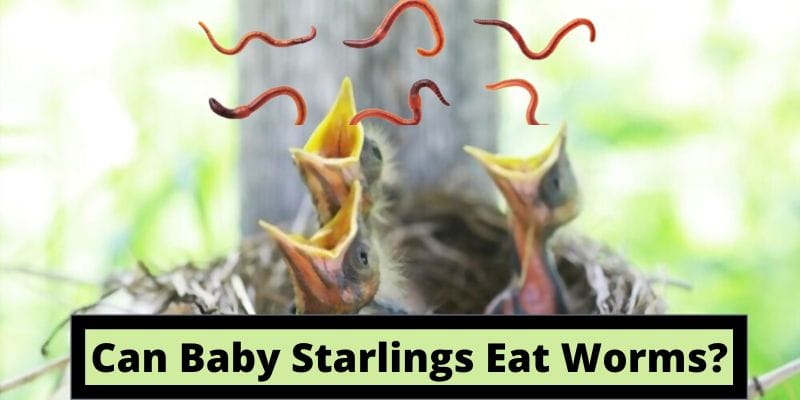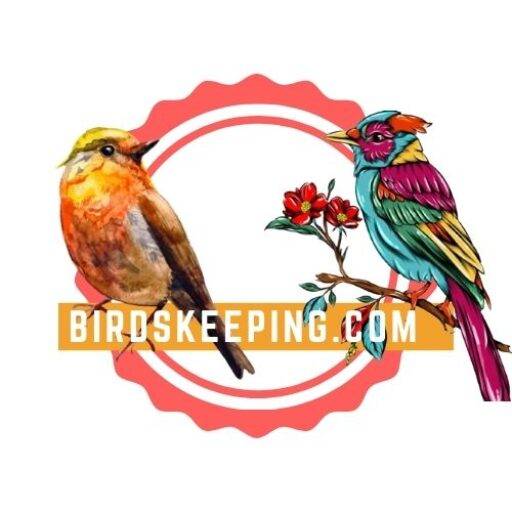Baby starlings can eat various foods that are suitable for them and are helpful for their growth. But worms are one of the questions that many people have asked about feeding worms to them. So can baby starlings eat worms? Can you feed baby starlings worms?
Baby starlings can eat worms without hesitation whenever you feed them. Worms are very beneficial for their health, and the nutrients present in the worms add value to the growth of baby starlings. Also, it would be best to wait for them to reach a certain age so that they can eat worms.
Are Worms Safe For Baby Starlings?
Yes, worms are safe for baby starlings. They are a popular source of food for wild birds, such as starlings and robins, who then carry the worms back to their nests.

Most people have offered health benefits from feeding worms to their pet birds by helping them digest their food and gain weight.
These days, many owners feed worms to their birds every week as part of an eco-friendly weekly routine.
Worms also provide good exercise for your pet bird. However, some experts warn that too much exposure can result in worm poisoning.
It is always best practice to consult with your vet about feeding worms or starting this bird care activity with your pets before giving them away.
The most important thing is providing a balanced diet of some protein as well as a variety of fresh fruits and vegetables.
You may want to consider feeding your bird mealworms instead of earthworms because they do not have the same risk factor for parasites, and the dirt that comes with them can be irritating or even toxic if ingested by tiny beaks or feet.
When Can Baby Starlings Start Eating Worms?
Baby starlings cannot eat worms until they are 2 to 3 weeks old. Babies of starlings start eating worms when they are about two weeks old.
Baby starlings, also known as nestlings, get their nutrition from the food that their parents bring to the nest.
Worms are a source of protein for these baby starlings. When food runs low in the nest, baby starlings may start to eat worms themselves because this gives them additional energy.
How To Feed Baby Starlings Worms?
Baby starlings are inquisitive and will likely try to eat anything you give them. Some people suggest putting it in a feeder outside for the birds, but those are too easily accessible for other predators like raccoons and cats. So the methods that you can use to feed worms to baby starlings are:
01. Find a handful of worms. Collect them in a bowl and put them on the ground near your backyard.
2. Put a worm at the bottom of your starling’s dish, and then do this three more times. Watch as they flock to the worms, get stuck in mid-air, turn around, and fly back down to eat!
3. Feed them to baby starlings by hand.
4. Feed them to the birds by placing the worms in a cup or on a piece of paper.
5. Repeat steps 1 to 4 every day until you are completely done with all your worms!
6. Let the baby starlings eat the worms while you are watching them, make sure your hands are clean, and that you have bird food in your pocket to supplement their diet if needed.
7. Put live worms directly in a nest for hatching birds to eat as needed but this is risky because you can’t be sure you know where it will end up.
8. Use pre-killed worms and feed them to hatching birds.
9. Feed the bird with a specially made worm feeder that you can buy at pet stores.
10. Use Mealworms, dried worms that can be fed to birds.
How Often & How Much To Feed Baby Starlings Worms?
If you are a new pet parent for baby starlings, you may be wondering how often and how much to feed your baby starlings. Well, luckily for you, we have all the answers in this informative and factual blog post.
Do not worry about the quantity. Feeding baby birds is extremely easy. You can feed baby starlings worms once or twice a day, and the amount they eat will depend on their age (older birds need more than younger ones).
For example, during the first two weeks of age, they typically eat one worm at each meal. As they approach three weeks old, it is common for them to double their intake of 2 worms per meal.
Foraging for worms is a favorite pastime of baby starlings during their fall migration. As they stop to feed and rest, the starlings will typically enjoy worms. In one year, an average bird may consume over 4 grams of earthworms in this way.
Can Baby Starlings Eat Mealworms?
Yes, baby starlings can eat mealworms! Mealworms are a great food for baby starlings because they are high in protein, low in fat, and a good source of vitamins and minerals.
They also have the bonus of being soft enough that even the most sensitive mouths will not chafe. A healthy diet is important to keep baby birds strong and growing, so start feeding them mealworms today!
Can Baby Starlings Eat Earthworms?
Yes, baby starlings can eat earthworms. In the wild, baby birds will naturally feed off of whatever is on the ground beneath them.
You may want to offer your baby starling live feeder worms or mealworms so that they are not solely reliant on what they can find in their natural environment.
Earthworms are not toxic to birds and will carry many nutrients, like iron. However, it is best if you only give your bird a worm around once a week because too much iron exposure could lead to anemia and create gastrointestinal issues for the pet bird that lives with you!
Last Words
Baby starlings can eat worms whenever you feed them in a proper way after they reach a certain age when they can easily consume worms without any difficulty.
They can eat different kinds of worms such as earthworms, mealworms, live worms, etc. But before serving them worms, you should keep in mind that you must avoid overfeeding them.
Overfeeding them with worms may lead to severe health problems due to the lack of nutrients present in other foods, such as seeds.
That’s why you need to serve them mixed foods and don’t serve them only one food frequently.
Birdskeeping is supported by its readers. When you purchase through links on our site, we may earn an affiliate commission. Also, as an Amazon affiliate, we earn from qualifying purchases without costing you extra.

